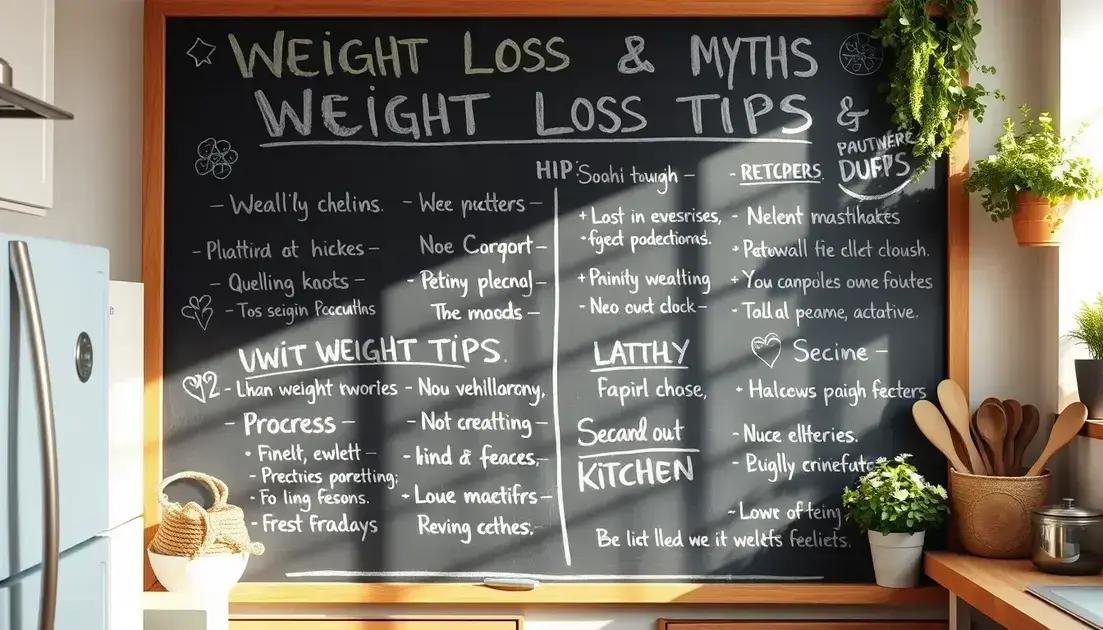
Uncovering Weight Loss Myths: Essential Facts You Must Know Today
-
Maria Duarte
-
20, janeiro, 2025
Topics
 Shared
Shared
In today’s world, there is a lot of information circulating about weight loss and its numerous myths. It’s essential to discern truths from fiction to achieve effective results.
This post aims to uncover Weight Loss Myths and Facts so you can embark on a successful weight loss journey with the right knowledge.
Let’s dive into the reality of weight loss, taking a closer look at all facets, including diet, exercise, and lifestyle changes.
Understanding Common Myths About Weight Loss
Myths About Weight Loss can often lead to confusion and misinformation. Here are some common myths and the facts that debunk them:
Myth: Skipping meals helps with weight loss
Fact: This can lead to overeating later.
Myth: Carbs make you gain weight
Fact: It’s more about the type and amount of carbs consumed.
Myth: Spot reduction is possible
Fact: You cannot target fat loss in specific areas of the body.
Myth: Consuming fat makes you fat
Fact: Healthy fats are essential for a balanced diet.
Myth: Only extreme diets work for weight loss
Fact: Maintaining a healthy lifestyle tends to yield much better results.
Importance of Understanding These Myths
Understanding these myths is crucial for making informed decisions about nutrition and fitness routines.
Fact vs. Fiction: Separating Weight Loss Truths

Fact vs. Fiction: Separating Weight Loss Truths
Weight loss can often feel like navigating a complex maze, primarily due to the myriad of information available. The first truth to acknowledge is that not all weight loss tips are created equal. For example, it is often said that all calories are the same, but the source of those calories matters significantly. Nutrient-rich foods not only support overall health but also help in feeling full longer.
Fiction: ‘All calories are equal.’ Fact: The nutritional value of calories counts. Whole foods provide vitamins and minerals that support metabolism and health.
Additionally, exercise is frequently touted as the primary tool for weight loss. While it is essential for maintaining a healthy lifestyle and burning calories, weight loss is predominantly influenced by diet. Reducing calorie intake and making healthier food choices are vital first steps toward shedding pounds.
Fiction: ‘You must exercise excessively to lose weight.’ Fact: A balanced approach between diet and exercise is most effective.
Lastly, it’s crucial to distinguish between myths that promote unrealistic expectations, such as rapid weight loss through extreme diets. Sustainable weight loss requires a commitment to gradual change. Remember, the journey towards health and fitness is a marathon, not a sprint.
Fiction: ‘Extreme diets guarantee quick results.’ Fact: Healthy and gradual changes yield lasting results.
Debunking Popular Weight Loss Misconceptions
Debunking Popular Weight Loss Misconceptions
Many misconceptions surround weight loss, making it challenging to know what to believe. One common myth is that the only way to lose weight is to cut out entire food groups. This approach is not sustainable and can lead to nutrient deficiencies.
Fiction: ‘You must eliminate carbs to lose weight.’ Fact: Balance is key; enjoying all food groups in moderation supports long-term success.
Another misconception is that drinking only juices or following liquid diets is an effective strategy. While these might show quick results, they can hinder metabolism and overall health, leading to weight gain after returning to solid foods.
Fiction: ‘Liquid diets are a safe and effective weight loss method.’ Fact: Solid foods include fiber and nutrients necessary for a healthy body.
Furthermore, many believe that weight loss is a linear process. In reality, it’s normal for weight to fluctuate due to various factors, including water retention and hormonal changes.
Fiction: ‘Weight loss should always be consistent.’ Fact: Fluctuations are typical and should be expected in any weight loss journey.
Lastly, the idea that everyone can achieve the same results with the same methods is misleading. Each body is unique, and what works for one person may not work for another.
Fiction: ‘One weight loss plan works for everyone.’ Fact: Individualized approaches are the best way to find success.
How Culture Shapes Weight Loss Beliefs

Cultural perceptions significantly affect how people approach weight loss. Each culture has its own ideals of beauty, which in turn influences how individuals perceive their bodies and what methods they choose to lose weight. For instance, in some cultures, being curvy is celebrated, while in others, a slim figure is idealized.
“Belief:” ‘Thinness is synonymous with health’ is a widespread notion in many Western cultures. “Fact:” Health is complex and not solely determined by body size.
Media portrayal also plays a crucial role. Advertisements may promote specific body types, leading individuals to adopt unhealthy habits to fit these images. Social media can amplify these beliefs, presenting curated lifestyles as the norm.
Impact: Exposure to images of idealized bodies can result in body dissatisfaction, pushing individuals to pursue extreme diets or workouts without proper knowledge.
Cultural traditions surrounding food also inform dieting practices. In some cultures, food is a communal experience and central to social gatherings, making restrictive diets feel isolating.
“Belief:” ‘Certain diets are wrong because they go against cultural norms.’ “Fact:” It’s possible to adapt diets that respect cultural values while achieving health goals.
To challenge these beliefs, education and awareness are essential. Promoting diverse body representations in media can help create a healthier perspective on weight and wellness.
Conclusion: Understanding how culture shapes beliefs is crucial for developing effective weight loss strategies that are both respectful and sustainable.
Science-Backed Weight Loss Facts
Weight loss occurs when you burn more calories than you consume. This principle is the foundation of any successful weight loss plan.
High-protein diets can aid in weight loss. Protein helps you feel full, increases metabolism, and maintains muscle mass while losing fat.
Staying hydrated supports weight loss efforts. Drinking water can boost metabolism and help control hunger. Aim to drink plenty of water throughout the day.
Getting enough sleep and managing stress are essential for effective weight loss. Inadequate sleep and high stress can lead to hormonal imbalances that promote weight gain. Prioritizing rest and relaxation can facilitate a healthier weight loss experience.
The Impact of Diet on Weight Loss Truths

The Impact of Diet on Weight Loss Truths
The role of diet in weight loss cannot be overstated. Nutrition directly influences body composition, metabolism, and overall health. It’s essential to recognize that not all calories are equal; the types of food consumed matter.
Fact: High-fiber foods, such as fruits, vegetables, and whole grains, can promote fullness and help control appetite. Incorporating these foods leads to better weight management.
Truth: Processed and sugary foods can lead to unhealthy eating patterns, increased cravings, and ultimately weight gain. These foods often provide empty calories without offering nutritional benefits.
Dietary balance: A well-rounded diet includes a variety of nutrients while limiting saturated fats and sugars. This balance aids metabolic function and supports sustained weight loss efforts.
Hydration: Drinking water before meals can reduce calorie intake. Often, people confuse thirst with hunger, leading to unnecessary snacking.
It’s essential to focus on long-term dietary changes rather than short-term fixes. Sustainable habits lead to lasting results and improved overall well-being.
Exercise Myths and Facts for Effective Weight Loss
Exercise Myths and Facts for Effective Weight Loss
Understanding the relationship between exercise and weight loss is essential for developing effective fitness strategies. Many people fall prey to common myths that misrepresent how exercise contributes to losing weight.
Myth: ‘You need to exercise for hours daily to lose weight.’ Fact: Short, high-intensity workouts can be very effective. Consistency and variety matter more than excessive duration.
Myth: ‘Lifting weights makes you bulk up.’ Fact: Strength training helps build muscle, which boosts metabolism and aids in fat loss. Women, in particular, do not bulk up from lifting weights due to lower testosterone levels.
Myth: ‘You can out-exercise a poor diet.’ Fact: Exercise alone cannot compensate for unhealthy eating habits. A balanced diet and regular exercise work best together for weight loss.
Myth: ‘Cardio is the only way to lose weight.’ Fact: While cardio has its benefits, incorporating strength training and flexibility exercises can provide comprehensive health benefits and aid weight loss.
Incorporating a variety of exercises, including cardiovascular, strength training, and flexibility workouts, helps to achieve overall health and supports effective weight loss.
Fad Diets: Myths Surrounding Quick Fixes
 Fad Diets: Myths Surrounding Quick Fixes
Fad Diets: Myths Surrounding Quick Fixes
Fad diets often promise rapid weight loss with minimal effort, but these plans can be misleading. Many of them are poorly balanced and can lead to health issues. One common myth is that you can lose weight quickly by eliminating food groups.
Myth: ‘Cutting out carbs guarantees weight loss.’ Fact: Carbohydrates are a vital energy source. The quality of carbs, such as whole grains versus refined sugars, matters more than merely cutting them out.
Myth: ‘Detox diets flush out toxins and help with weight loss.’ Fact: The body has its methods of detoxification and does not require special diets for this function. Moreover, many detox diets can lead to nutrient deficiencies.
Myth: ‘You must starve yourself to lose weight.’ Fact: Starvation can reduce metabolism and lead to weight regain. Instead, healthy eating habits are key for successful weight loss.
Myth: ‘All-natural diets are safe and effective.’ Fact: Just because something is labeled as natural does not mean it is healthy or effective. Always research and consider potential side effects.
Instead of jumping on fad diets, focus on balanced eating and sustainable lifestyle changes for lasting weight loss results.
The Role of Metabolism in Weight Loss Myths
Metabolism is often a misunderstood topic when it comes to weight loss. Many people believe that a faster metabolism guarantees quick weight loss.
Myth: ‘A slow metabolism is the main reason for weight gain.’ Fact: While metabolism plays a role, lifestyle choices such as diet and exercise have a more significant impact on weight management.
Myth: ‘You cannot change your metabolism.’ Fact: Although genetics influence metabolism, factors like muscle mass and physical activity can boost metabolic rate.
Myth: ‘Eating small meals boosts your metabolism.’ Fact: Meal frequency does not significantly alter metabolism. Total daily caloric intake is more important.
Myth: ‘Certain foods can dramatically increase metabolism.’ Fact: While some foods, like spicy peppers, may provide a slight boost, the effect is minor compared to overall diet and exercise.
Understanding these myths can help individuals make informed decisions about their weight loss efforts and focus on sustainable habits.
Lifestyle Changes: Facts for Sustainable Weight Loss

Lifestyle Changes: Facts for Sustainable Weight Loss
Sustainable weight loss is achieved through gradual lifestyle changes rather than quick fixes. Understanding the importance of consistency and healthy habits is essential.
Fact: Small, achievable goals lead to lasting change. Instead of aiming for drastic weight loss, focus on making manageable adjustments to your daily routine.
Fact: Incorporating physical activity into your daily life is vital. Simple actions such as walking, taking the stairs, or participating in enjoyable sports contribute to overall fitness.
Fact: Building a support system can enhance your efforts. Whether it’s friends, family, or weight loss groups, having encouragement from others plays a crucial role in maintaining motivation.
Fact: Mindless eating can sabotage weight loss efforts. Staying mindful of portion sizes and the types of food you consume helps in making better choices.
Fact: Maintaining a balanced diet with a variety of nutrient-dense foods is key. Ensuring you include fruits, vegetables, whole grains, and lean proteins will keep your body nourished.
Long-term success comes from adopting these sustainable lifestyle changes, leading to improved overall health and wellness.
Understanding Calorie Count Myths
Understanding Calorie Count Myths
Calorie counting is a common practice in weight loss efforts, but several myths can cloud its effectiveness. One prevalent myth is that all calories are equally beneficial.
Myth: ‘All calories are the same.’ Fact: Calories from nutrient-dense foods like fruits and vegetables provide vitamins and minerals that support health, while empty calories from sugary or processed foods can lead to weight gain.
Myth: ‘You can eat whatever you want if you stay under your calorie limit.’ Fact: Quality matters; consuming a balanced diet with nutrients is crucial for overall health, not just calorie intake.
Myth: ‘Counting calories is the only way to lose weight.’ Fact: While calorie awareness is helpful, focusing solely on numbers can lead to unhealthy habits. Mindful eating and listening to hunger cues can promote a better relationship with food.
Myth: ‘All labeled calorie counts are accurate.’ Fact: There can be discrepancies in food labeling. Variations in cooking methods, ingredient portions, and serving sizes can affect actual calorie intake.
Understanding these myths can guide individuals toward healthier eating habits and more effective weight management strategies.
How Psychology Influences Weight Loss Beliefs

Psychology plays a significant role in weight loss, affecting our beliefs and behaviors towards food and fitness. Understanding this influence can lead to better management of weight loss efforts.
Fact: Emotional eating is a common issue. Many people eat in response to feelings such as stress or sadness rather than hunger. Recognizing triggers can help improve eating habits.
Myth: ‘Weight loss is purely a physical challenge.’ Fact: Mental and emotional factors are just as vital. Developing a healthy mindset is necessary for achieving lasting results.
Fact: Setting realistic goals promotes a sense of achievement. Unrealistic expectations can lead to disappointment and giving up. Aim for small, attainable targets.
Fact: Social support can boost motivation and accountability. Sharing goals with friends, family, or support groups encourages commitment and reduces feelings of isolation.
Fact: Positive self-talk enhances motivation. Replacing negative thoughts with encouraging affirmations can foster a better relationship with food and body image.
By understanding how psychology influences our behavior, individuals can adopt healthier habits that sustain weight loss in the long term.
Conclusion
In summary, understanding the numerous myths and truths surrounding weight loss is essential for anyone looking to achieve their goals.
From recognizing the impact of lifestyle changes to debunking fad diets, individuals can make more informed choices.
A balanced approach that incorporates healthy eating, exercise, and psychological well-being lays the foundation for sustainable weight loss.
It’s crucial to focus on gradual changes rather than quick fixes for lasting success and improved overall health.
FAQ – Understanding Weight Loss Myths
What are some common myths about weight loss?
Common myths include the belief that skipping meals aids in weight loss and that all calories are equal.
How does diet impact weight loss?
A balanced diet is crucial for weight loss. Calories from nutrient-dense foods support health better than empty calories.
Is exercise necessary for weight loss?
While exercise is beneficial for overall health, weight loss primarily depends on a balanced diet.
Are fad diets effective for weight loss?
Fad diets often promise quick results but typically lead to unsustainable habits and rapid weight regain.
Do I need a fast metabolism to lose weight?
Weight loss is not solely reliant on metabolism; lifestyle choices and dietary habits play a more significant role.
What are some tips for sustainable weight loss?
Focus on small, achievable goals, incorporate physical activity, and cultivate a supportive environment.
How does psychology influence weight loss efforts?
Mental and emotional factors are crucial; positive self-talk and support systems can greatly enhance motivation.
 Return blog
Return blog